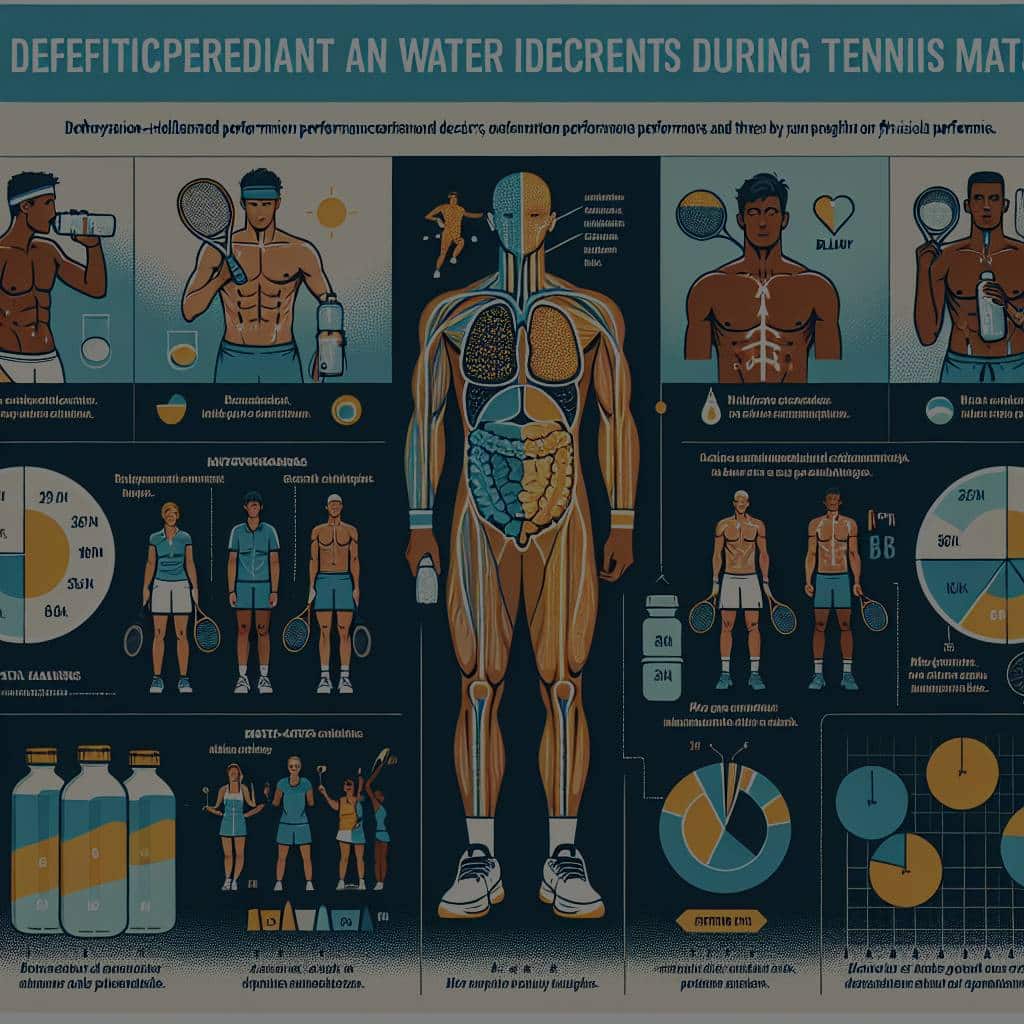How Can Periodic Water Intake During Matches Benefit Tennis Players?

Tennis is a high-intensity sport that requires a significant level of physical conditioning and endurance. As you all are aware, hydration plays an indispensable role in preserving the body’s performance during strenuous activities. In this piece, we’ll be taking a deep dive into the importance of periodic water intake for tennis players during matches, how it affects their muscle performance, recovery time, and overall bodily functions. We will also review various hydration strategies that can be employed to maintain optimal performance.
The Role of Water in Sports Performance
Before we delve into the specifics of tennis, let’s first examine the general role that water plays in sports performance. It’s no secret that water is vital to our survival; it makes up around 60% of our body weight and is involved in nearly every bodily function.
Avez-vous vu cela : What’s the Most Effective Way to Use Sports Psychology in Youth Soccer Coaching?
The Importance of Water for Exercise
Water is crucial for exercise because it aids in maintaining our body temperature, lubricating our joints and providing a medium for various biological reactions to occur. In the context of sports, one of the primary reasons water is so essential is because of its role in muscle function. Muscles are composed of approximately 75% water, and even a slight level of dehydration can lead to a decrease in muscle strength and stamina.
As a result, tennis players who don’t adequately hydrate could see a significant decrease in their performance. Regular water intake, on the other hand, can help players maintain their muscle function and performance level throughout the match.
A lire aussi : How Can Plyometric Training Be Safely Incorporated into Youth Basketball Programs?
Water and Heart Performance during Exercise
Another crucial aspect to consider is the effect of water on the heart during exercise. When you’re dehydrated, your body’s blood volume decreases, which means your heart has to work harder to pump blood and deliver oxygen and nutrients to your muscles. This can increase your heart rate and make any physical activity feel more strenuous.
For tennis players, this could mean faster fatigue, decreased performance, and even a higher risk of injury. By ensuring they stay hydrated during matches, players can keep their heart rates stable, improve their endurance, and reduce their risk of injury.
Hydration Strategies for Tennis Players
Now that we’ve reviewed the importance of water for sports performance, let’s explore some specific strategies that tennis players can use to stay hydrated during matches.
Timing of Water Intake
While it’s important to drink water throughout the day, the timing of your water intake can also significantly affect your performance. For tennis players, it’s particularly beneficial to hydrate before, during, and after a match.
Before a match, it’s recommended to drink at least 500 ml of water 2-3 hours beforehand. This gives your body time to absorb the water and ensures you’re well hydrated before you start playing. During the match, try to drink around 150-200 ml every 15-20 minutes, depending on the intensity of the game and the weather conditions. After the match, rehydrate immediately to replace the fluids lost through sweat and support your body’s recovery.
Replacing Electrolytes
Water is not the only thing lost through sweat; electrolytes like sodium and potassium are also depleted. These electrolytes are crucial for muscle function and fluid balance in the body. Therefore, in addition to water, tennis players should also consider taking sports drinks or foods high in these electrolytes.
Review of the Benefits of Regular Water Intake for Tennis Players
Now, let’s review the benefits that regular water intake during matches can provide to tennis players. From improving muscle performance to speeding up recovery, the regular consumption of water proves to be an indispensable strategy for athletes.
Enhanced Muscle Performance
As we discussed earlier, muscles are primarily made up of water, and dehydration can significantly impair their function. Regular water intake during tennis matches can help to maintain muscle strength and endurance, allowing players to perform at their best throughout the match.
Speedier Recovery Time
After an intense match of tennis, your body needs to recover. Rehydrating post-match helps to replace lost fluids and electrolytes, promoting faster recovery. It can help in reducing muscle soreness, replenishing muscle glycogen stores and promoting overall muscle recovery.
Superior Overall Performance
When you’re adequately hydrated, your heart doesn’t have to work as hard, your body temperature is better regulated, and your muscles work more efficiently. This can lead to improved overall performance during a tennis match.
To sum up, water is not just a thirst quencher; it’s an essential part of your training regimen. So, the next time you step onto the tennis court, make sure you have your water bottle at hand. After all, it could be the secret weapon that takes your performance to the next level.
Meta Analysis of Water Intake Influence on Body Composition and Performance
For a deeper understanding of the importance of hydration in tennis, we delve into several scientific studies and systematic reviews. A vast number of these studies, available on resources like NCBI NLM, underline the crucial role that regular water intake plays in the improved performance and recovery of tennis players.
One such study highlights how dehydration can reduce a player’s body mass by up to 3%, leading to a 7-10% drop in performance. This relatively small percentage of body weight loss due to inadequate hydration can make a significant difference to a player’s performance, further emphasizing the importance of water intake during exercise.
Another systematic review published in Sports Sci points out the benefits of proper hydration on the body composition of athletes. The study discovered that regular water intake impacts the lean body mass, aiding in maintaining muscle mass and promoting a healthier body composition.
In addition, a meta-analysis conducted by Sports Med found that a strategy of regular water intake during tennis matches improved players’ heart rate response, body temperature regulation, and overall performance. Under varying environmental conditions, players who stayed adequately hydrated were able to perform more effectively due to the optimal functioning of their cardiovascular and thermoregulatory systems.
Nutritional Strategies: Balancing Water and Protein Intake
Balancing water intake with other nutritional needs, especially protein intake, is another aspect that tennis players should consider. Consuming the right amount of protein is vital for muscle repair and growth. However, the process of digestion and absorption of protein produces metabolic heat that increases body temperature and can lead to dehydration.
Therefore, it’s vital to pair protein intake with proper hydration. If you’re drinking water in an open separate window before, during, and after your match, consider consuming your protein-rich meal or drink in the two-hour window before the match. This can help in better digestion and absorption of the protein, without compromising the body’s hydration status.
Moreover, it’s beneficial to include electrolytes such as sodium and potassium in the diet, which are essential for maintaining fluid balance in the body. These can be derived from sports drinks or foods and should be consumed along with water.
Conclusion: Hydration – A Key Player in Tennis Performance
To conclude, regular water intake during tennis matches is undeniably beneficial to players. From enhancing muscle performance and aiding in speedy recovery to maintaining an ideal body composition and balancing other nutritional needs, hydration plays a fundamental role in a player’s performance.
The benefits aren’t just limited to the physiological aspect. Adequate hydration can also improve mental acuity and concentration, which are equally important for a sport that demands strategic thinking and quick decisions.
Remember, hydration isn’t just about quenching your thirst. It’s a cornerstone of your performance on the court. So, before you step into your next match, plan your hydration strategy well. Ensure you have your water bottle handy and remember to hydrate before, during, and after the match to maximize your performance. Keep in mind that water isn’t just a thirst quencher; it’s a performance booster.
In the words of the renowned Tennis player Arthur Ashe, "Start where you are. Use what you have. Do what you can." So, start with water, use it as your tool, and do your best on the court.
